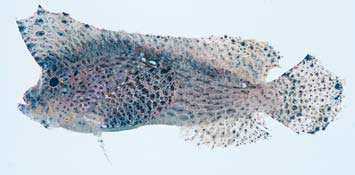APLOACTINIDAE
Velvetfishes
By Hisashi Imamura
 Acanthosphex leurynnis |
 Cocotropus larvatus |
|
Small marine fishes usually under 5 cm. Body usually compressed. Head usually with knoblike lumps. Eye small to relatively large. Snout often prominent. Mouth moderate to large. Upper and lower jaws with small conical teeth. Palatine always lacking tooth. Vomerine teeth present or absent. Gill rakers usually small or moderate; 0-6 on upper limb of first gill arch and 3-11 on lower. Anterior isthmus with fleshy extension in most species. All fin rays unbranched. Dorsal-fin origin above eye or almost so, except in Adventor and Peristrominous. Dorsal fin with 9-16 spines and 7-16 soft rays; first 3-5 spines usually appear segregated, either elevated or largely without membrane connection with the rest of the spinous dorsal. Anal fin usually with 0-5 weak or blunt spines and 5-16 soft rays. Pelvic fin with 1 spine and usually 2 or 3 soft rays (rarely 1). Lateral line with 9-16 tube-like scales. Body scales modified to prickly scales (but some without scales). Color: body usually brown, reddish brown, or greenish. Similar family occurring in the area. Scorpaenidae: pectoral fin with 1 spine and 5 soft rays. Tetrarogidae: anterior isthmus lacking fleshy extension. Remarks. Aploactinids usually known from the shallow sea bottom, often found between or under vegetation or rocks. Most species well camouflaged. With no commercial importance. |

|
|